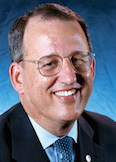'It's Not About You'
Posted on March 15, 2005Last spring, Carolina alumnus and Wachovia Chairman, CEO and President Ken Thompson ’73 spoke as part of the Dean’s Lecture Series at UNC’s Kenan-Flagler Business School. After his address, he responded to questions, and one of the first inquiries came from a Carolina MBA student who wondered what job he should take to enhance
the probability that he one day might also become a chief executive officer.

Doug Dibbert ’70
Thoughtfully, Thompson noted that those who make hiring decisions have become wary of young professionals w ho seem too anxious about where a particular job might take them. Thompson went on to comment — “It’s not about you.” He further said that the objective in accepting any job should be to perform at a very high level, and if one does, then one’s performance will result in other opportunities for service and leadership. Thompson, a Morehead Scholar, began his banking career with ambitions to someday become the CEO, but for nearly a decade at First Union, he wondered if he had been lost within the bank’s bureaucracy and became concerned about whether he ever would have an opportunity for senior leadership.
Thompson’s words “it’s not about you” struck me as reflective of the kind of leadership that has so well-served Carolina these many years. When UNC law Professor Willianl B. Aycock ’37 agreed to “take a turn” as Carolina’s chancellor in 1957, he was quick to volunteer that he never had ambition to be chancellor, but he was willing to serve with the understanding that his professional calling was teaching and that he one day would return to the classroom. Like those before him and since, Chancellor Aycock cared deeply about advancing Carolina and was not at all concerned about promoting himself. He sought others for his leadership team w hose principal motivation was to serve Carolina.
This spirit of selfless service permeates Carolina. As he was approaching his retirement as dean of UNC’s School of Medicine (as well as president of UNC Health Care System and vice chancellor for medical affairs), Dr. Jeff Houpt had a leisurely lunch with me, during which I asked what had surprised him most during his seven years as dean. Instantly, he responded: “The unparalleled commitment of the faculty to serving North Carolina.” Houpt taught and served in senior administrative positions at other medical schools before coming to Carolina and commissioned a survey of faculty of the medical school to learn about what they saw as the important priorities as well as the important values to be affirmed. So Houpt’s response was grounded not only in what he had observed but also in solid empirical data.
Similarly, UNC chemistry Professor Holden Thorp ’86, who recently was named to chair the department, professed upon receiving the GAA’s Distinguished Young Alumnus Award that after earning his doctorate at Cal Tech and receiving more lucrative offers from MIT and California-Berkeley, it was always his ambition to return to Carolina and “to teach, do research and public service for another 30 to 40 years.”
Those who have thrived and made the most lasting contributions to Carolina have been those whose primary motivation has been to serve others and to serve at our University. They often decline repeated offers to go elsewhere, and while they want and expect to be fairly compensated, they wisely recognize the frustrations that come to those whose primary objective is to be certain that no one anywhere who does what they do is earning a penny more than they are.
For years, Carolina’s coaches have reminded their players that Carolina’s teams achieve their greatest potential only when they compete as a team — not as individuals. When necessary, our coaches point out that at UNC, the name on the front of the jersey is more important than the name on the back. And Carolina coaches are careful to emphasize that they are coaching “Carolina’s” team and “our” team. In that spirit, at the beginning of the 2004-05 basketball season, Carolina ‘s men’s team embraced this quote: “It’s amazing what people can accomplish if they have no concern about who receives the credit.”
When important decisions about our University are made based upon what is best for Carolina, we are being faithful to the Carolina values that have served us so well for so long. We must avoid taking actions or making decisions that serve only someone’s personal ambition. As Ken Thompson responded to that MBA student, “It’s not about you.” Most likely, each of us can achieve whatever personal ambitions we might have by focusing on and serving others. Certainly, that has been Carolina’s happy tradition.
Yours at Carolina,

Douglas S. Dibbert ’70
